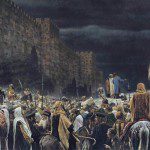by every word
Ever since I first heard it in Sunday school I’ve been stirred by the mysterious declaration in Deuteronomy that we do not live by bread alone, but by every word that comes from the mouth of God. In ancient Hebrew the word for word was dabar, which meant thing. Utterance brings forth some thing into the world. In speaking we participate in the work of creation, which happened by means of utterance: “God said ‘Let there be light,’ and there was light.”
Certain ritual speech acts retain a dimension of sacramentality—a sense of imparting or making happen as they are spoken: “Peace be with you”; “I take thee to be my wedded wife”; “So be it”; “Thy will be done.” Simple imperatives also bring forth, though they don’t “enact” in the same way: “Listen.“ “Play ball.” “Stop.” “Wake up!”
Of course there’s no guarantee that our imperatives will bring forth what we intend; they depend on a response. I remember, for instance, discovering that to a late-sleeping teenager “Wake up” was generally a signal to turn over and burrow deeper into a warm pillow. A line I still laugh over with the aforementioned teen, now well into adulthood, is delivered by one of Christopher Fry’s amusing–and memorably ineffectual–characters in The Lady’s Not for Burning, frustrated at being summarily ignored: “Am I invisible? Am I inaudible? Do I merely festoon the room with my presence?”
But, weakened as they have been by overuse, misuse, commercial exploitation, political spin and outright lies that erode certain words and phrases to vestiges or valueless drivel, words still matter. We still live by words. Not only by every word that comes from the mouth of God, but by all the words we’ve been given, or imagined or derived or developed over time to name and frame human experience. We count on them. We sometimes stake our lives on them.
Which makes it not only offensive but horrifying to hear lies passed off glibly in public places to serve political agendas that drift further and further from standards of evidence, common experience, or common sense. The harm a lie does is far more consequential than we tend to recognize, having lulled ourselves into acceptance of so many of them. Most of us are perfectly aware that ads tell partial truths, if they deal in truth at all; that “public relations” generally means sanctioned propaganda; that the standards to which high school debate teams are don’t hold on the floor of Congress, subject as that debate is to the pressures of heavily financed lobbying. In our lifetimes we have witnessed a decay of language, accelerated by mass media, unlike any before, though analogies could be made to the great propaganda machines of modern police states.
This, then, is a time for poets—and that includes all of us who string sentences together–to do the sacred work Mallarmé, and later Eliot described as “purifying the dialect of the tribe”—retrieving and reframing words for lively, life-giving use. Putting them back into circulation in startling, sometimes astonishing ways, making them memorable and invigorating and usable once again for our deepest common purposes.
I’m not being sentimental here. Poetry is political work, whether or not its aim is political; it is strenuous stewardship at the heart of whose purposes lies survival itself. We need words that support life, give it shape and meaning, allow us to share what is life-giving, words animated by human breath that carries them on the wind or to be borne by the Spirit toward ears that hear. Airborne, they “infect” us with awareness and intention. People live and die by them every day. And our word choices, like all our other choices, move in one direction or the other. Therefore, if I may borrow a profound imperative from Deuteronomy again, “Choose life.”












